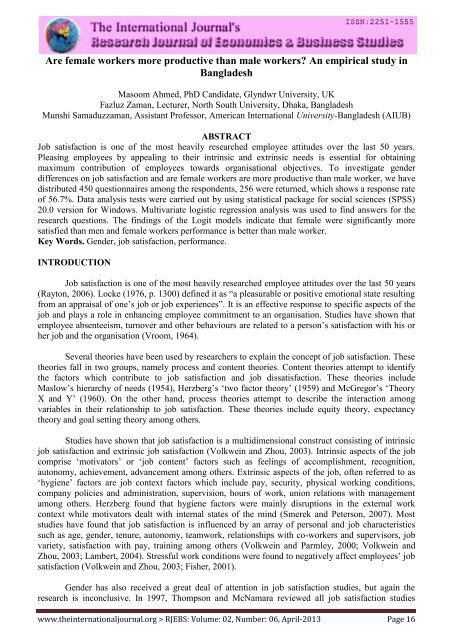Research Journal of Economics & Business Studies - RJEBS - The ...
Research Journal of Economics & Business Studies - RJEBS - The ...
Research Journal of Economics & Business Studies - RJEBS - The ...
- No tags were found...
Create successful ePaper yourself
Turn your PDF publications into a flip-book with our unique Google optimized e-Paper software.
Are female workers more productive than male workers? An empirical study in<br />
Bangladesh<br />
Masoom Ahmed, PhD Candidate, Glyndwr University, UK<br />
Fazluz Zaman, Lecturer, North South University, Dhaka, Bangladesh<br />
Munshi Samaduzzaman, Assistant Pr<strong>of</strong>essor, American International University-Bangladesh (AIUB)<br />
ABSTRACT<br />
Job satisfaction is one <strong>of</strong> the most heavily researched employee attitudes over the last 50 years.<br />
Pleasing employees by appealing to their intrinsic and extrinsic needs is essential for obtaining<br />
maximum contribution <strong>of</strong> employees towards organisational objectives. To investigate gender<br />
differences on job satisfaction and are female workers are more productive than male worker, we have<br />
distributed 450 questionnaires among the respondents, 256 were returned, which shows a response rate<br />
<strong>of</strong> 56.7%. Data analysis tests were carried out by using statistical package for social sciences (SPSS)<br />
20.0 version for Windows. Multivariate logistic regression analysis was used to find answers for the<br />
research questions. <strong>The</strong> findings <strong>of</strong> the Logit models indicate that female were significantly more<br />
satisfied than men and female workers performance is better than male worker.<br />
Key Words. Gender, job satisfaction, performance.<br />
INTRODUCTION<br />
Job satisfaction is one <strong>of</strong> the most heavily researched employee attitudes over the last 50 years<br />
(Rayton, 2006). Locke (1976, p. 1300) defined it as “a pleasurable or positive emotional state resulting<br />
from an appraisal <strong>of</strong> one’s job or job experiences”. It is an effective response to specific aspects <strong>of</strong> the<br />
job and plays a role in enhancing employee commitment to an organisation. <strong>Studies</strong> have shown that<br />
employee absenteeism, turnover and other behaviours are related to a person’s satisfaction with his or<br />
her job and the organisation (Vroom, 1964).<br />
Several theories have been used by researchers to explain the concept <strong>of</strong> job satisfaction. <strong>The</strong>se<br />
theories fall in two groups, namely process and content theories. Content theories attempt to identify<br />
the factors which contribute to job satisfaction and job dissatisfaction. <strong>The</strong>se theories include<br />
Maslow’s hierarchy <strong>of</strong> needs (1954), Herzberg’s ‘two factor theory’ (1959) and McGregor’s ‘<strong>The</strong>ory<br />
X and Y’ (1960). On the other hand, process theories attempt to describe the interaction among<br />
variables in their relationship to job satisfaction. <strong>The</strong>se theories include equity theory, expectancy<br />
theory and goal setting theory among others.<br />
<strong>Studies</strong> have shown that job satisfaction is a multidimensional construct consisting <strong>of</strong> intrinsic<br />
job satisfaction and extrinsic job satisfaction (Volkwein and Zhou, 2003). Intrinsic aspects <strong>of</strong> the job<br />
comprise ‘motivators’ or ‘job content’ factors such as feelings <strong>of</strong> accomplishment, recognition,<br />
autonomy, achievement, advancement among others. Extrinsic aspects <strong>of</strong> the job, <strong>of</strong>ten referred to as<br />
‘hygiene’ factors are job context factors which include pay, security, physical working conditions,<br />
company policies and administration, supervision, hours <strong>of</strong> work, union relations with management<br />
among others. Herzberg found that hygiene factors were mainly disruptions in the external work<br />
context while motivators dealt with internal states <strong>of</strong> the mind (Smerek and Peterson, 2007). Most<br />
studies have found that job satisfaction is influenced by an array <strong>of</strong> personal and job characteristics<br />
such as age, gender, tenure, autonomy, teamwork, relationships with co-workers and supervisors, job<br />
variety, satisfaction with pay, training among others (Volkwein and Parmley, 2000; Volkwein and<br />
Zhou, 2003; Lambert, 2004). Stressful work conditions were found to negatively affect employees’ job<br />
satisfaction (Volkwein and Zhou, 2003; Fisher, 2001).<br />
Gender has also received a great deal <strong>of</strong> attention in job satisfaction studies, but again the<br />
research is inconclusive. In 1997, Thompson and McNamara reviewed all job satisfaction studies<br />
www.theinternationaljournal.org > <strong>RJEBS</strong>: Volume: 02, Number: 06, April-2013 Page 16

















